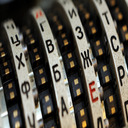29C3 - Version 1.9
| Referenten | |
|---|---|
|
|
Dr Nicolas T. Courtois |
| Programm | |
|---|---|
| Tag | Day 3 - 2012-12-29 |
| Raum | Saal 4 |
| Beginn | 20:30 |
| Dauer | 01:00 |
| Info | |
| ID | 5225 |
| Veranstaltungstyp | Vortrag |
| Sprache der Veranstaltung | englisch |
| Feedback | |
|---|---|
|
Haben Sie diese Veranstaltung besucht? Feedback abgeben |
Security Evaluation of Russian GOST Cipher
Survey of All Known Attacks on Russian Government Encryption Standard

In this talk we will survey some 30 recent attacks on the Russian GOST block cipher.
Background: GOST cipher is the official encryption standard of the Russian federation, and also has special versions for the most important Russian banks. Until 2012 there was no attack on GOST when it is used in encryption with random keys. I have developed more than 30 different academic attacks on GOST the fastest has complexity of 2^118 to recover some but not all 256-bit keys generated at random, which will be presented for the first time at CCC conference. It happens only once per decade that a government standard is broken while it is still an official government standard (happened for DES and AES, no other cases known). All these are broken only in academic sense, for GOST most recent attacks are sliding into maybe arguably practical in 30 years from now instead of 200 years... Our earlier results were instrumental at ISO for rejecting GOST as an international encryption standard last year. Not more than 5+ block cihers have ever achieved this level of ISO standardisation in 25 years and it NEVER happended in history of ISO that a cipher got broken during the standardization process.
Two main papers with 70+30 pages respectively which are http://eprint.iacr.org/2011/626 and http://eprint.iacr.org/2012/138. Two other papers have been already published in Cryptologia journal which specializes in serious military and government crypto.
The talk will cover three main families of attacks on GOST: high-level transformations, low- level inversion/MITM/guess-then-software/algebraic attacks and advanced truncated differential cryptanalysis of GOST.
Plan for the talk:
First I cover the history of GOST with major Cold War history events as the necessary background.
Then I describe in details three main families of attacks:
1) self-smilarity attacks which generalize slide fixed point and reflection attacks, and provide a large variety of ways in which the security of the full GOST cipher with 32 rounds can be reduced to the security of GOST with 8 rounds in a black box reduction and thus the task of the cryptanalys is split into two well-defined tasks.
2) detailed software/algebraic and MITM attacks on 8 rounds and how weak diffusion in GOST helps.
3) advanced truncated differential attacks on GOST
